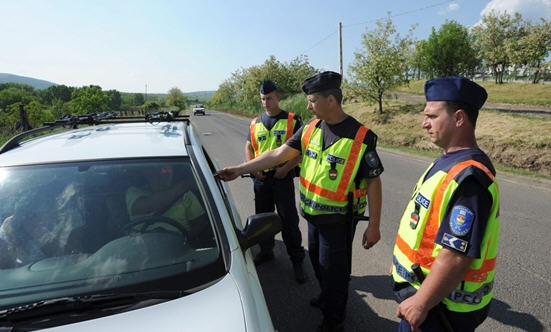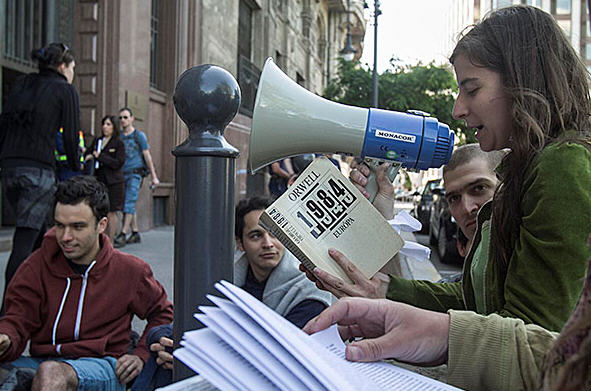There are times when governments can go very wrong with an appointment. It can happen anywhere. The famous American case was George H. W. Bush’s appointment of David Souter to the US Supreme Court in 1990. Souter was supposed to be a conservative but turned out to be a “closet liberal.”
Something similar happened to Fidesz twice lately with appointments to the position of ombudsman. Prior to 2010 there were several ombudsmen, each responsible for a specific field: environmental issues, human rights, data protection, minority rights, etc. Vikor Orbán wanted to have only one ombudsman, and he picked Máté Szabó, the man responsible for human rights before 2010. At the time I was not particularly impressed with Szabó who, in my opinion, didn’t distinguish himself in his earlier position. Most of the issues that interested him sounded petty to me. In fact, it might have been this very aspect of Szabó’s activities that appealed to Orbán. Perhaps he thought that Szabó would get bogged down in picayune issues and would be too busy to spend much time on the constitutionally questionable legislative work of the Fidesz voting machine. To everybody’s surprise Szabó became a very active ombudsman who resolutely fought to salvage the remnants of Hungarian democracy.
Szabó’s tenure ended on September 24, 2013, and János Áder nominated László Székely, who had held government positions in both the first and the second Orbán governments. In fact, way back in 2001 his name came up as the nominee of President Ferenc Mádl to the position of ombudsman responsible for data protection but then, because of MSZP’s opposition, Viktor Orbán couldn’t give the job to his favorite candidate. Once he had a two-thirds majority, however, he didn’t have to worry. Székely’s appointment was assured.
When Székely’s name surfaced as the potential nominee the opposition parties had all sorts of objections. They were worried about his long, close association with the current government. Some people pointed out that his knowledge of constitutional law was scanty. Népszava described the departure of Szabó as the fall of the last bastion in the defense of democracy. I ended my earlier post on this appointment with these words: “For the time being it is hard to say what kind of ombudsman Székely will be. After all, Szabó turned out to be excellent despite earlier indications and predictions to the contrary.” I added: “It may happen again, but Viktor Orbán rarely makes mistakes on personnel choices.” Well, it seems that he did.
After his appointment Székely gave a number of interviews in which he emphasized that in spite of his government jobs and close association with Fidesz he will be an independent and judicious ombudsman. That assurance was to be expected. But, looking back at these interviews, we can already find signs that Székely might be less of a Fidesz clone than some expected. For example, he told the reporter of Népszabadság that “a good ombudsman must show solidarity with the dejected, the defenseless and must be sensitive to problems of destitution and poverty.” Not exactly the philosophy of the Fidesz ideologues. A few days later in a longer interview, also with Népszabadság, he said: “Believe me, I will jealously guard my professional prestige acquired in the last thirty years.”
During his interviews he kept repeating his belief that after the 2014 election the burden on the lone ombudsman will be lighter because he will not be the only person who can turn to the constitutional court for remedy. He seems to have been convinced that the opposition parties would get at least 25% of the seats, which would allow them to turn to the constitutional court themselves. As we know, this is not how things turned out.
Székely carefully avoided criticizing his predecessor and stressed the necessity of continuity. Indeed, he left the structure of the office pretty well intact. He kept emphasizing, however, that he will try to improve the score card in favor of the ombudsman’s office when dealing with the constitutional court. That is, he wanted to have more cases decided in his office’s favor. Given the composition of the constitutional court, I doubt that Székely’s hopes will materialize, but it is certainly a worthy goal.
Székely took over the position at the end of September. I began to notice increased activity in his office already in early February. The Hungarian Helsinki Commission turned to Székely to investigate the “three-strike law” which their lawyers regarded as unconstitutional. Székely concurred and called on the Ministry of Administration and Justice to discuss how to change the law to make it constitutionally acceptable. The ministry’s reply came swiftly: they are not changing the law and they are not ready to negotiate.
Székely seems to be interested in education. He turned to Zoltán Balog’s ministry several times, pointing out the inadequate teaching and equipment in segregated schools. He complained about the curriculum, saying that he finds it worrisome that students encounter the heinous effects of ideas of hatred only in the last year of high school. In his opinion societal change is necessary in this respect and here education has a large role to play. Although the government denied that there were serious problems supplying schools with textbooks, Székely’s office investigated and found that the government didn’t tell the truth. There were schools where some of the textbooks didn’t arrive until late December.
He also pays attention to the homeless. About a week ago he turned to the Kúria for remedy. In his opinion the local administration in Budapest designated far too many places as forbidden territories for the homeless. The ombudsman asked the Kúria to change some of the regulations and invalidate others.
As for the organic farm of Kishantos, Székely’s office began to investigate the situation already in December and turned to Sándor Fazekas, minister of agriculture, for information. The ombudsman expressed the view that the organic farm, the result of twenty years of careful attention, deserves constitutional protection. At that point Fazekas assured Székely that he would call together a forum of experts and civic groups to work out a strategy for the constitutional protection of environmental values. Of course, there is no forum, no strategy, only a ruined crop.
These are only a few of the many cases Székely has handled since October 2013. His appointment is for six years, and he will be the only person who can do battle with the government and the constitutional court. Not an enviable position to be in.




